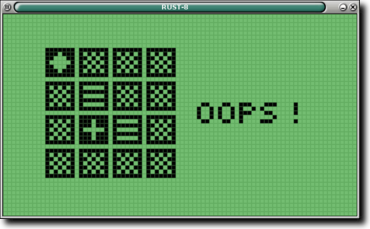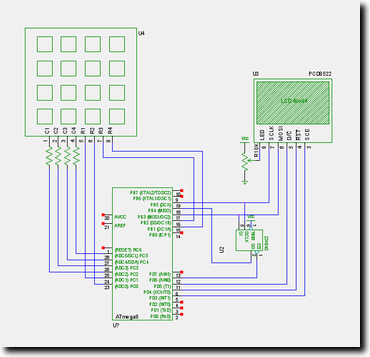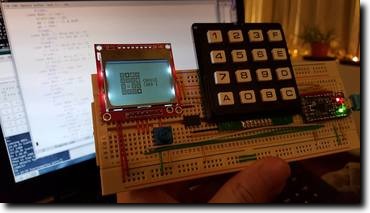Posts tagged rust
Rust on the MOS 6502: Beyond Fibonacci
18 September 2021 (programming rust llvm c64 retro chip-8)On August 15th, the following answer showed up on the Retrocomputing Stack Exchange site:
llvm-mos compiles a considerable subset of C++ to 6502 machine code out of the box. IIRC it's just missing "runtime support"; things like RTTI, exceptions, and the runtime layout of VTables. [...]
I came across this answer about a week later, so just in time for ICFP 2021 to start. I also had my Haskell Love talk coming up, and I really wanted to get the RetroClash page in shape by then, so that I can direct people there at the end of my talk.
But still! LLVM, and consequently, Rust, on a C64! Damn if that isn't the perfect nerd-sniping for me. So I looked around to find this 6502.org forum post that shows compiling a Rust implementation of the Fibonacci function and linking it with a small C main. I've reproduced their code here in a Git repo for easier fiddling.
So after ICFP, although other things kept piling up, including a GM-ing gig playing Trail of Cthulhu's excellent The Dance in the Blood and coordinating with the awesome David Thinnes on getting Arrow DECA support into clash-pong in time for Haskell Love, I carved out a weekend to dust off my Rust-on-AVR CHIP-8 implementation to try to get it running on the C64.
Full code on GitHub
Continue reading »Rust on AVR: Beyond Blinking
12 May 2017 (programming rust llvm electronics avr chip-8)In February this year, Dylan McKay wrote in his blog:
In the coming months the Rust compiler should support AVR support out-of-the-box!
I've been watching this from afar, planning to try it out when AVR support is mainlined into Rust; I thought it would be much easier to wait until the dust settles than trying to track the development versions of LLVM and Rust at the same time. However, it's now May, LLVM 4.0 has come out with the new AVR backend and the Rust compiler has been updated to use it; and my interest in Rust has also started to grow: in late March one of my beachside readings on Gili Meno was O'Reilly's Programming Rust, and a Rust meetup group started in Singapore. And so I started to formulate a plan.
Two years ago, Viki and I designed and prototyped a very minimal AVR-based handheld console that can run CHIP-8 programs. It's made up of an Adafruit Trinket (an AVR ATMega328P running on 12MHz@3.3V, with a bit of circuitry to be programmable via serial-over-USB), a serial SRAM chip, an LCD from an old Nokia phone, and a 4x4 keypad.
The 2015 software was, of course, written in C++. So my idea was to rewrite that in Rust, mainly aiming to use Rust's algebraic data type support with pattern matching. Given the way one usually programs microcontrollers, I think pattern matching gives me the most bang for my buck for now, until we start designing and implementing funky Rust libraries that use the borrows checker to enforce all kinds of interesting non-memory-allocation invariants.
And so, while fiddling my thumbs waiting for AVR support to show up in the next Rust release, I got busy reimplementing the CHIP-8 engine in Rust, in two modules: chip8-engine is a no_std library implementing the CHIP-8 machine with all IO done over a trait, and chip8-sdl is the executable that links to the library and implements the frontend using SDL. This is the exact same architecture we used back in 2015 to develop the C++ version; this allowed us to debug the CHIP-8 implementation on an x86 computer, only having to worry about running on the device for the IO-specific parts.

Two weeks ago, I decided to take the plunge and build LLVM and the Rust compiler from the dev branch where AVR support is being worked on.
At this point, we have to note a big difference between the development process on C++ vs. Rust. With the C++ version, once the engine was running OK on the computer, we simply recompiled it using an AVR-targeting C++ compiler and linked it with code that communicates with the serial RAM chip, the LCD, and the keypad. On the other hand, at least for now, AVR support in LLVM and Rust is in its infancy, so even if the engine works on x86, there is absolutely no guarantee that it will do remotely the same on AVR as well.
And so the next step was to use simavr to create a simulator for our board. The simulator implements just enough of the PCD8544 protocol to be able to display the pixels of the LCD in an SDL window; implements just enough of the serial SRAM protocol to read/write single bytes; and implements the keypad in the obvious way. I debugged the simulator by running the C++ version of the firmware; then when I decided I trusted the simulator enough, it was time to go back to Rust and see what it takes to compile it to AVR.
First, I tried just compiling the Hello World of microcontrollers: blinking an LED.
Right out the gate, this fails. It fails even before you get to try compiling your program. It fails because the Core library of Rust itself cannot be compiled on AVR due to a compiler bug. So the zeroth thing you have to do, before you even do the first thing, is to start trimming down Rust's libcore until it doesn't contain too much stuff that compiling it triggers the aforementined bug, but still contains enough to be useful. For example, you need to include core::iter if you want to do any for loops. I've put my version of libcore-mini on GitHub; if you need anything that is not included from the real libcore, just try adding it and hope for the best.
BTW, if you use a custom libcore, there's a bunch of magic Rust incantations you need in your code:
#![feature(no_core)] #![no_core] extern crate libcore_mini as core; // These are imported to get for-loops working #[allow(unused_imports)] use core::option; #[allow(unused_imports)] use core::iter; #[allow(unused_imports)] use core::ops;
Also the module providing main() has to jump through a bunch of extra hoops:
pub mod std {
#[lang = "eh_personality"]
#[no_mangle]
pub unsafe extern "C" fn rust_eh_personality(state: (), exception_object: *mut (), context: *mut ()) -> () {
}
#[lang = "panic_fmt"]
#[unwind]
pub extern fn rust_begin_panic(msg: (), file: &'static str, line: u32) -> ! {
loop{}
}
}
#[no_mangle]
pub extern fn main() {
// Finally! Put your real main() here!
}Note that rust_begin_panic just loops, since there's nothing better I could come up with for a microcontroller.
Once you have your own stripped-down libcore, you can start writing programs. Here's my first one, a blinker that uses a timer interrupt instead of busy-waiting:
use core::intrinsics::{volatile_load, volatile_store};
mod avr {
pub const DDRB: *mut u8 = 0x24 as *mut u8;
pub const PORTB: *mut u8 = 0x25 as *mut u8;
pub const TCCR1B: *mut u8 = 0x81 as *mut u8;
pub const TIMSK1: *mut u8 = 0x6f as *mut u8;
pub const OCR1A: *mut u16 = 0x88 as *mut u16;
}
use avr::*;
const MASK: u8 = 0b_0010_0000;
#[no_mangle]
pub extern fn main() {
unsafe {
volatile_store(DDRB, volatile_load(DDRB) | MASK);
// Configure timer 1 for CTC mode, with divider of 64
volatile_store(TCCR1B, volatile_load(TCCR1B) | 0b_0000_1101);
// Timer frequency
volatile_store(OCR1A, 62500);
// Enable CTC interrupt
volatile_store(TIMSK1, volatile_load(TIMSK1) | 0b_0000_0010);
// Good to go!
asm!("SEI");
loop {}
}
}
#[no_mangle]
pub unsafe extern "avr-interrupt" fn __vector_11() {
volatile_store(PORTB, volatile_load(PORTB) ^ MASK);
}Again, at first, this failed due to another compiler bug that I've reported here and got fixed in a couple hours; and then for the first weekend, I got into this pattern of compiling something, running it in the simulator, noticing that the MCU gets jammed due to invalid machine code, or LLVM fails to turn IR into AVR assembly, and so on; reporting the issue at hand; then I'd test and confirm that the fix works.
As I dug myself deeper into both LLVM and the Rust compiler, after a while I started not just reporting bugs and reducing test cases, but fixing them as well. In fact, if you want to try Rust on AVR today, I very much recommend using LLVM from my fork since it has all my changes that haven't been upstreamed yet, but are all needed to compile my code.
And so now, two weeks later, I can reasonably claim that I know LLVM (something that I always wanted to learn but haven't gotten around to until now), I have a complete Rust implementation of CHIP-8 that runs on my real hardware board, and there are interesting problems to work on in Rustc and LLVM moving forward. Also, the Rust API to the actual AVR IO functionality that I've implemented is very rudimentary; I know of at least one project already that tries to design a nicer API, and we could probably also reuse some of the ideas from Marten's C++ AVR API to do bundled IO port updates.


